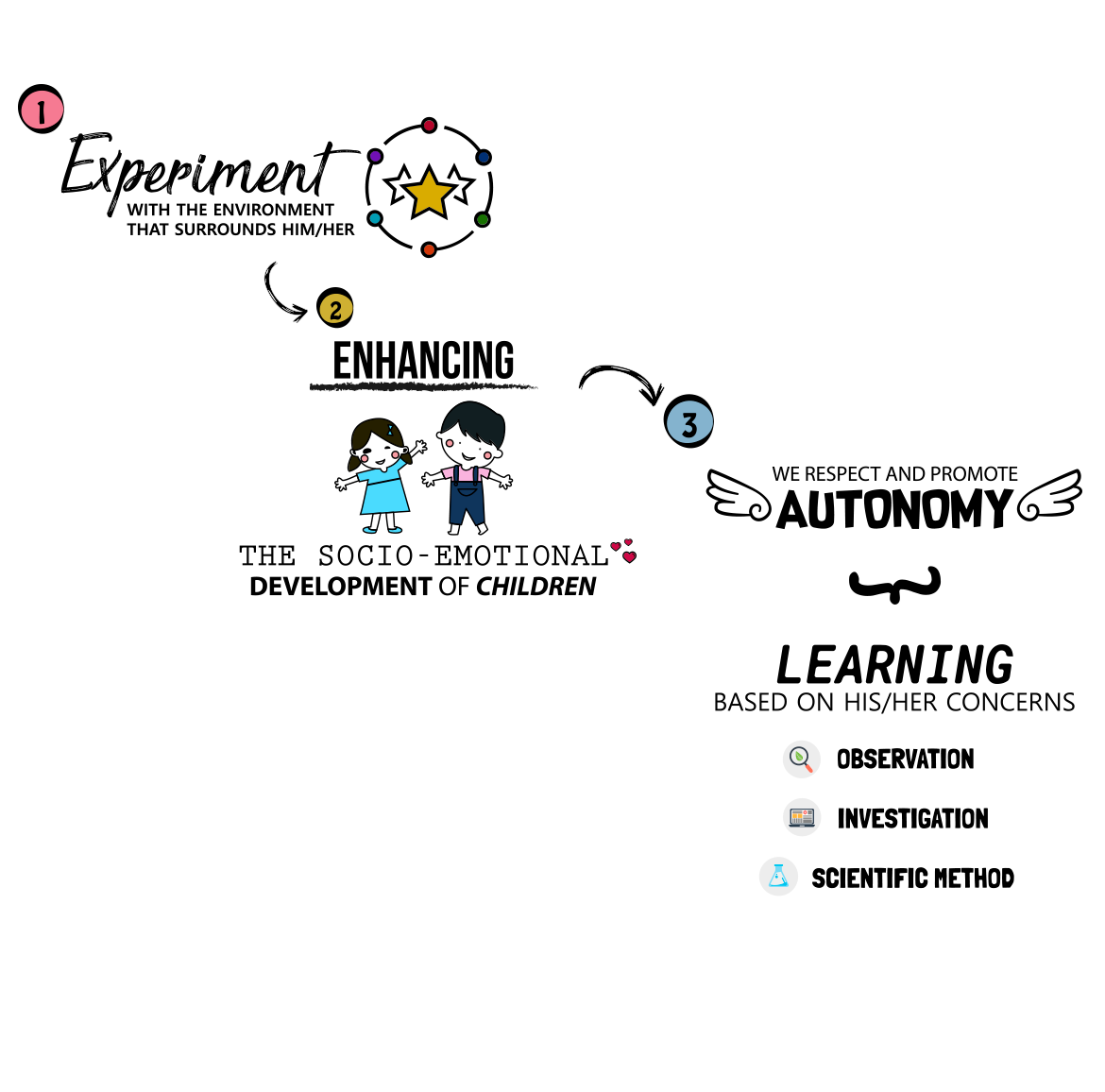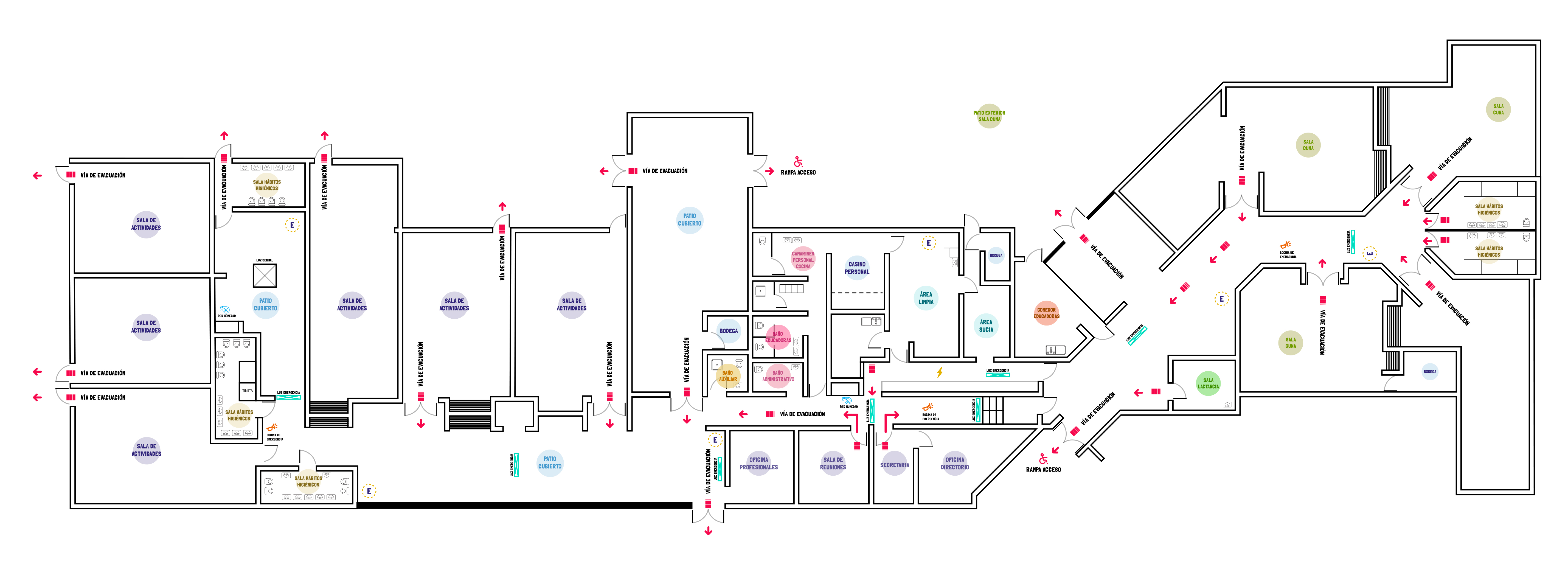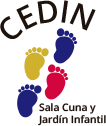Methodology
Our job focuses on learning by actively experimenting with the environment and interacting with adults to favor all areas of development, enhancing the strengths that each child carries intrinsically. This allows strengthening the relationship they establish with their peers and their parents. In this way, the bond between parents and kids help to optimize each child’s social-emotional development.
A dynamic development of work in thematic areas inside our Kindergarten and Nursery School manages to enhance children’s choice based on their tastes and preferences, promoting then their autonomy. Within this work, as CEDIN, we promote the development of skills based on observation of the environment, exploration of the environment, the ability to research everything around them and learning in the scientific method.
Our Educational Project also considers the acquisition of fundamental and basic notions, pillars of initiation to mathematics and literacy, in order to foster the development of verbal and nonverbal communication, which allows them to interact in daily life situations. Likewise, we give importance to the actions that promote abilities and motor skills – both fine and gross – in the different activities carried out in our institution every day.

Levels
NURSERY SCHOOL
The Nursery School is organized into four levels of care, according to the different ages of the children:
A- Infants 1 Level: (84 days to 8 months)
B- Infants 2 Level: (9 to 12 months)
C- Intermediate level: (1 year and 1 month to 1 year and 4 months)
D- Open Education Level: (1 year and 5 months to 1 year and 10 months)
Our facilities
- We have four large rooms implemented according to both children’s needs and their stage of development.
- A game hall and interactive whiteboard, which are daily used in activities to deepen concepts and create instances of learning.
- Two fully stocked bathrooms to facilitate the infants’ diaper replacement.
- Breastfeeding room for the mothers and children who are in this stage. This room has been implemented to achieve a quiet and relaxed environment to foster the bond between mother and child during breastfeeding.
How is child development strengthened at each level?
A. Infants Level 1 and 2: Developing incipient skills and abilities, as well as encouraging the learning of spatial concepts and stimulating communication with peers and adults, establishing emotional ties with the people in their environment.
B. Intermediate and Open Education Levels: Establishing the foundations of concepts of space-time domain, developing skills and abilities, encouraging both autonomy and the social-emotional term.
KINDERGARTEN
How is it organized?
The Kindergarten level serves children who are 2 to 4 years 11 months and is organized in 6 levels of care:
- a. Nursery Level A, B, and C (ages 2 to 3)
- b. Middle Level A and B
- c. Pre-Transitional Level
What infraestructure does Kindergarten at CEDIN have?
- We have six thematic rooms: a construction room, a quiet room, an art room, a science room, a home-themed room and a reading room. We also have an interactive whiteboard.
- Two halls to execute motor activities;
- A gym with proper implementation to develop the child’s gross motor skills, such as exercise machines, pilates balls, mats, balls, ribbons, balance boards, among others);
- Two bathrooms implemented according to the children’s ages, which are large enough for six people each.
- A bath with a diaper changing unit, which has an air curtain to avoid environmental contamination;
- Four rooms that have electric curtains to prevent greater sun exposure;
- An office to be used by our multidisciplinary team: a speech therapist, a nutritionist, a psychologist and an English language teacher.
How is child development strengthened at each level?
The middle levels promote comprehensive development as a person to an environment that facilitates the discovery through direct experience. The autonomy is progressively developed, the interrelations with their peers and adults are strengthened, and the psychomotor development appropriate to their stage of maturity is promoted.
The Pre-Transitional level aims to develop the uniqueness as an individual child, fostering the acquisition of gradual responsibility for themselves, relationships with others and their environment.
We aim at introducing the English language into every level at our Kindergarten education. In addition to this, we promote an early rapprochement to Mapudungun, having a result in expanding the field of various languages and fostering our children’s intercultural processes.
We promote the care for the environment, cultivating fine herbs and fruits in school gardens made by children, under the guidance of our educators.
Journeys
Our Kindergarten offers the following options of work day:
- Full Day: 7:45 a.m. to 6:00 p.m. (includes all meals)
- Half Day Morning: 7:45 a.m. to 1:30 p.m. (includes snack and lunch)
- Half Day Afternoon: 1:30 p.m. to 6:00 p.m. (includes eleven and dinner)
Integral Nutrition
Because food is a fundamental part of our children’s development and growth, we give support to parents and guardians here at CEDIN, providing a balanced diet for their children throughout their preschool years.
We care about instructing in and forming healthy eating habits from a young age, in order to lead a correct diet during their growth.
How do we do it?
- We have a modern food center, food manipulators and a nutritionist, who are responsible for planning and elaborating a suitable diet in terms of nutritional requirements and needs,
- We work with high quality products from certified suppliers. These products undergo an exhaustive control at the time they are received in order to check fruits and vegetables are in optimal conditions. We keep the cold chain of both refrigerated and frozen food. All this, in order to ensure the highest hygienic and organoleptic quality in the process of elaborating the product that will be consumed by our children.
- We also care about your children’s health, making a monthly nutritional assessment.
Risk Prevention Plan
As your child’s safety and integrity is fundamental to us, the institution has an emergency plan, which has been developed by the joint committee on health and safety, whose advisory body is the ACHS. The actions developed in this plan, internalized by the staff, allow to face the different situations derived from emergencies. For this, the professionals working at CEDIN are continuously training and updating knowledge to act if necessary.
The Cooper Fire, Earthquake and Chemical Emergency Plans are contemplated within the emergency plan.
In addition to this, we have a two-part committee, aimed at developing instances of improvement for our staff. Finally, the psychosocial committee is in charge of maintaining a harmonious climate within CEDIN, with the aim of ensuring the welfare of its workers.


